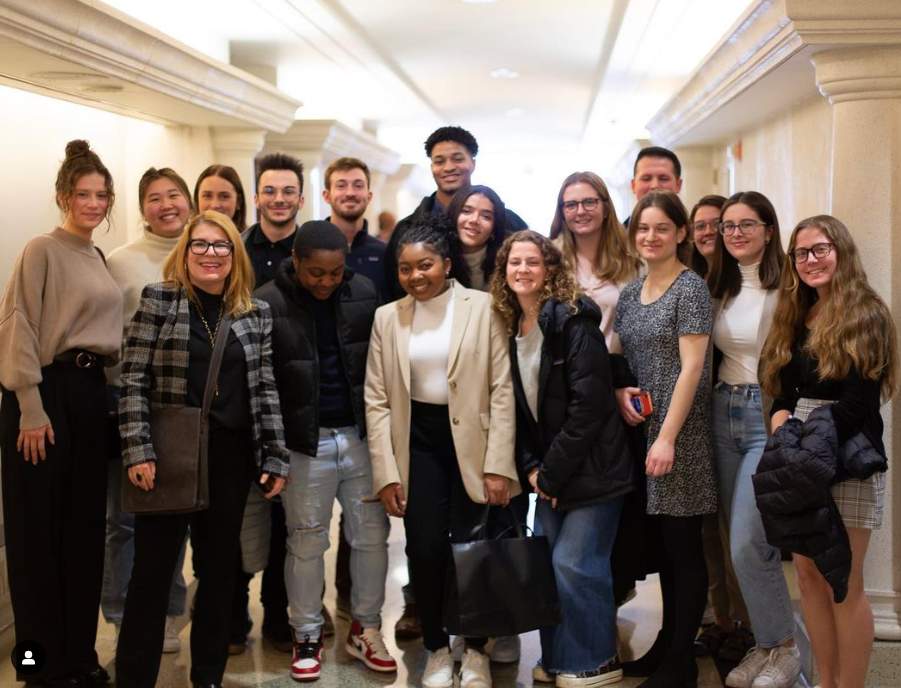Philadelphia Justice Projects Host Panelist Event Regarding Wrongful Convictions and Second Chances
Courtesy of @phillyjusticeproject on Instagram
Villanova’s undergraduate chapter of the Philly Justice Project.
April 5, 2023
Villanova’s chapter of the Philadelphia Justice Project hosted a panel event to spark conversation and call action to the racial, economic and gendered inequities within wrongful convictions. At “Wrongful Convictions and Second Chances,” panelists Professor Leigh Goodmark, Felix Rosado, Shameka Sawyer and Dr. Jill McCorkel spoke about their experiences regarding the American prison system and the necessity of change. This evening featured a conversation surrounding mass incarceration, unjust sentencing, wrongful convictions, commutation, clemency and gender and racial inequities within the criminal legal system.
The four panelists were individuals working on behalf of the wrongfully convicted, formerly incarcerated individuals, family members of the wrongfully convicted or legal scholars, each contributing unique advice or knowledge to the topics discussed.
A professor of law at the University of Maryland, Goodmark directs the Gender, Prison and Trauma Clinic that represents women and gender-nonconforming people seeking a second chance. Goodmark also provides direct representation in matters involving intimate partner abuse, sexual assault, trafficking and other cases involving gender violence. Goodmark discussed institutional racism and sexism within the law, and the way in which the law is written in terms of what it was meant to do.
“Reform makes people think we can fix this, you can’t fix this, it is doing what it was meant to do,” Goodmark said.
Additionally, she discussed the narrow view America holds in terms of what a “victim” of abuse or violence can look like, limiting the care that incarcerated females can receive facing gender-based violence.
As a Villanova alumnus and formerly incarcerated person, Rosado spoke of his experience fighting a death by incarceration sentence that he was recently released from via governor clemency. While fighting his sentence, Rosado founded many restorative justice initiatives including Let’s Circle Up, Alternatives to Violence Project, and currently serves as a Program Coordinator of Healing Futures, a youth restorative justice diversion program in Philadelphia. Rosado spoke of his advocacy in the coalition to abolish death by incarceration and his passion in ending caging of human beings and inhumane treatment.
“This is a system inherently dehumanizing and racist that must come to an end,” Rosado said.
Rosado strongly believes in prison abolition, understanding that there is no way to reform the corrupt system that exists.
A visionary leader in the fight for criminal justice reform and the founder of the 5 Shorts Project, Sawyer spoke on her experience with the corruption and racism of the criminal justice system. Sawyer is dedicated to using storytelling to advocate for justice and equality for individuals wrongfully convicted, as her son is currently fighting a wrongful death by incarceration sentence. Like Rosado, Sawyer brings a personal narrative to this topic, as she has firsthand experience with the impact the inequities in the system can have on individuals and their families, and she is committed to building a better and more just world for those affected by these issues.
“I publicly shared the prison system’s impact on my family for the first time, explaining how the injustices and disparities within the prison system impact marginalized communities and families,” Sawyer said. “It was a great platform to provide insight into the need for systemic change.”
She also expressed how average citizens can be clueless about the disparities within the system until it directly affects them or their family.
“To those unaware of these issues, I emphasize the importance of becoming educated on the topic,” Sawyer said. “By doing so, individuals can better understand the impact of these injustices on marginalized communities and the need for systemic change. The prison system affects us all, and it is our responsibility to demand equity and justice for all individuals impacted by the system.”
McCorkel, a professor of sociology and criminology at Villanova University, served as a panelist, speaking on her research investigating the social and political consequences of mass incarceration in the United States. McCorkel is also the founder and director of Villanova’s Philadelphia Justice Project, aiming to combat the growing violence and incarceration in the lives of women and girls. On the panel, McCorkel spoke of her involvement on petitions for commutations and parole, and her research and expert testimony in criminal and civil cases and appellate matters.
Surprise panelist, Morkea Spellman, also spoke of her direct experience of the injustices of America’s criminal justice system. Just last month, Spellman’s daughter, India Spellman, was the first woman and first Black woman to be exonerated in more than a generation from a wrongful conviction in the city of Philadelphia. Spellman spoke on the general lack of information about the injustices within the criminal justice system and emphasized the need for more young people to become involved in such matters, because she understands that these injustices can target average citizens regardless of race, gender, or class.
“Do not be afraid to speak out, it’s ok to be different,” Spellman said. “If there was no difference, there would be no equality. If we keep speaking, we will be heard.”
This panel event provided an opportunity for these five individuals to speak on their personal experience with direct work combatting the inequities within America’s criminal justice system.
“I thought the panel event hosted by PJP was timely and much needed,” Sawyer said. “It was great to see so many students in attendance, and I was honored to have the opportunity to share my insights and experiences with them.”
This event was an amazing opportunity for students, professors and Villanova faculty to hear from the panelists’ perspectives to further understand the complexities within the prison system, as well as hear about the importance of community advocacy.


